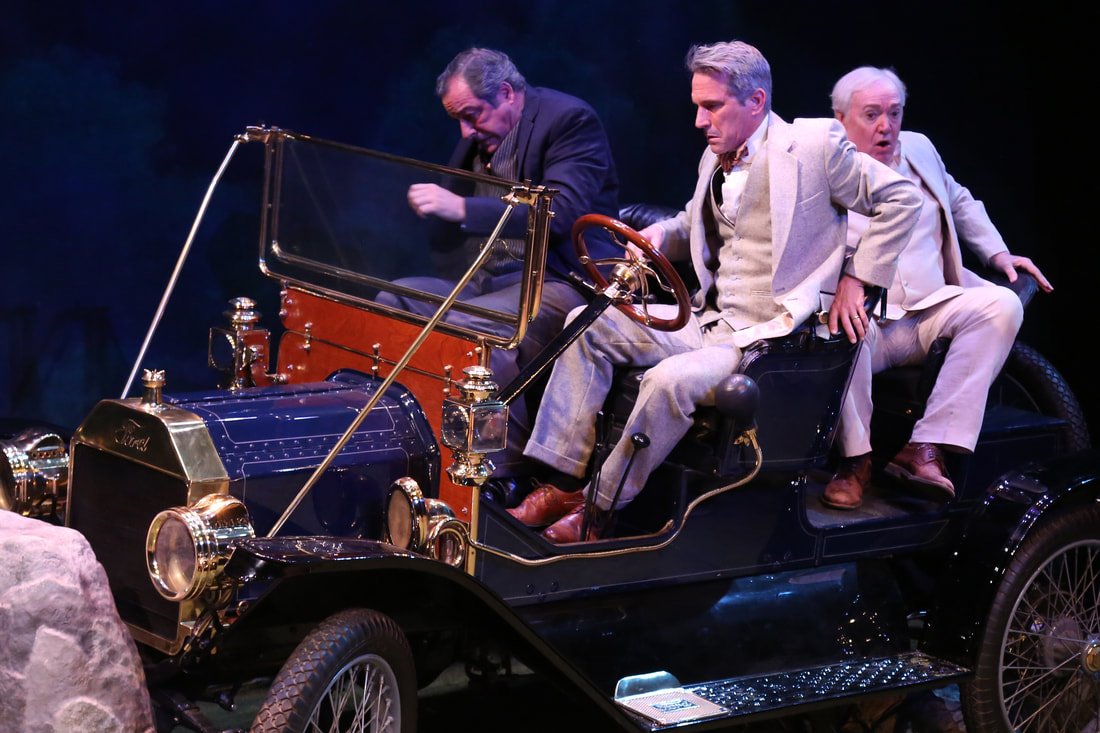|
Below: Manny Fernandes, Francis Gercke and Robert Smyth in "Camping with Henry & Tom." Photo by John Howard  In spite of the whimsicality of its title, Mark St. Germain’s “Camping with Henry & Tom” is a confrontational play. In imagining what might have happened when the automaking titan Henry Ford and the great inventor Thomas Alva Edison brought President Warren G. Harding along on one of their recurring camping adventures, St. Germain pits egos against egos and ideologies against ideologies in a kind of three-way sparring match. The resultant eruptions propel a story that begins with a hapless accident in the Maryland woods but soon turns dark and combative. Lamb’s Players Theatre is opening its 2018 season by staging the San Diego premiere of “Camping with Henry & Tom,” which debuted way back in 1993. Lamb’s previously enjoyed success with its thoughtful production of St. Germain’s “Freud’s Last Session,” another speculative work, in 2015. (In fact, that production’s co-stars, Francis Gercke and Robert Smyth, return in “Camping” as Ford and Edison respectively.) A sometimes awkward amalgam of comedy and drama, the Deborah Gilmour Smyth-directed “Camping with Henry & Tom” is not as durable a play as “Freud,” but it too is an actors’ showcase, with Gercke, Smyth and Manny Fernandes (as Harding) gamely stepping into the shoes of three larger-than-life historical personages, circa 1921. Stranded in the woods after hitting (with one of Ford’s spanking-new Model A’s) a deer, the bombastic Ford, irascible Edison and likably bland Harding find themselves with nothing to do after fashioning a makeshift campfire except talk. A lot. What begins innocently enough gives way to animus as the unsuspecting Harding discovers that the hyper-ambitious Ford intends to blackmail him (and he’s got plenty of damning ammunition) in return for getting cheap the Muscle Shoals hydroelectric plant and a pathway to the presidency for himself. Harding soon retaliates, with Edison somewhere in the middle, moralizing. The arch tenor of the first act yields to a second in which the revelations turn uglier (Ford’s anti-Semitism, for one) and the roused Edison injects himself more into the fray. At the same time, Fernandes’ Harding lets loose, insouciantly rebuffing Ford’s threats one minute, and literally howling like a wolf the next. The emotive register is all over the place by this time, with even the unseen, not-quite-dead deer eliciting sympathy from offstage. Whatever affection may have actually existed between Ford and Edison doesn’t really come through here. On their own, however, Gercke brings a little P.T. Barnum flash to his Ford, a man of sweeping and disturbing personal contradictions, while Smyth’s Edison is cerebral and patently realistic in a part that feels underwritten. Fernandes nicely humanizes Harding, an admittedly reluctant president who died two years into his term and who is best-known for the scandals revealed after his passing. Its insinuations about executive leadership (run the country like a business!) and dirty politics don’t necessarily make the quarter-century-old “Camping with Henry & Tom” a play for today’s times, but they certainly now, as perhaps they did before, give us pause. (Review originally published in the San Diego Union-Tribune on Feb. 26.)
0 Comments
Leave a Reply. |
AuthorDavid L. Coddon is a Southern California theater critic. Archives
July 2024
Categories |
David Coddon |
|